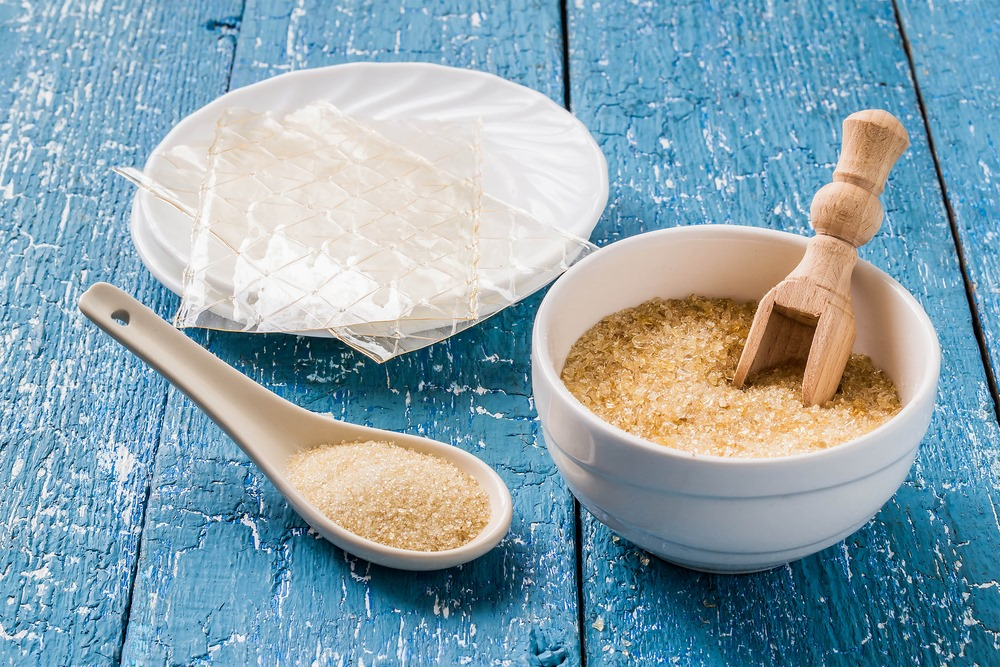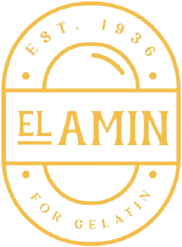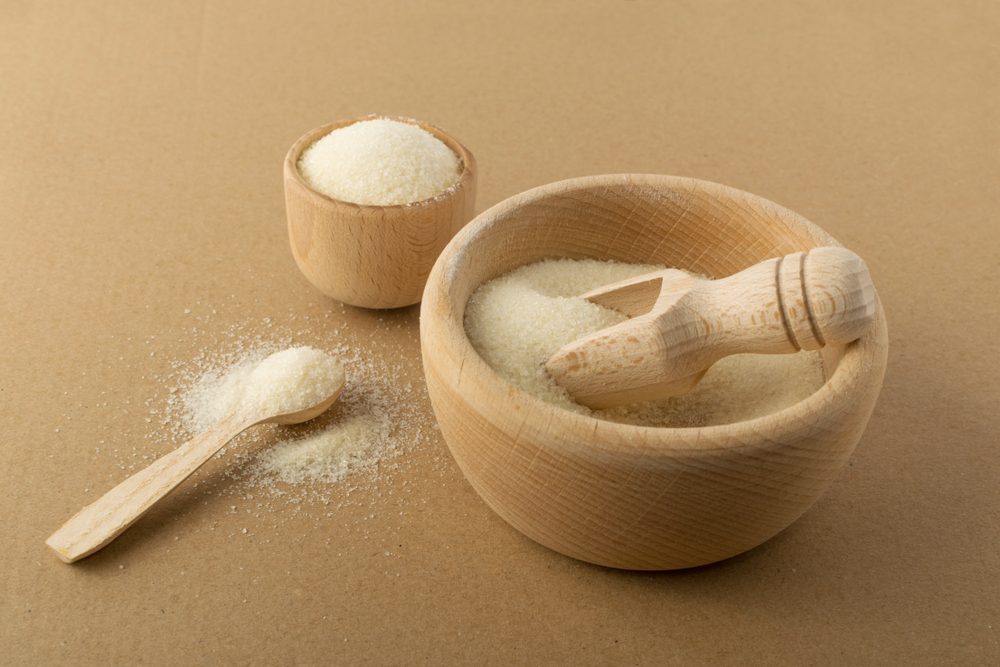Contributing to sustainability goals with El Amin gelatin
Industrial gelatin is an important component to manufacture different types of glue such as jelly glue, and hot melt glue. Gelatin-based glues are non-toxic and biodegradable, making them an attractive product to manufacturers and industries seeking environmentally friendly material.
Our Gelatin products include food products, pharma & health products as well as industrial products. In this article we will focus on industrial gelatin, which is used to make glue.
Unlike the older manufacturing processes, our El Amin industrial gelatin is made using a modern, high-tech production process which produces a sustainable adhesive solution for the local and international markets.

The many benefits of using El Amin industrial gelatin make it the best sustainable solution for your industry. It is non-toxic, biodegradable, recyclable, and safe to handle. It is water soluble and possesses excellent bonding properties.
Another benefit the gelatin industry brings to the world and the environment, is that by-products from the manufacturing of gelatin can be used for feed or as fertilizer in agriculture or even for fuel applications, further enhancing gelatin’s contribution to the zero-waste economy.
At El Amin Gelatin factories, our industrial gelatin is completely natural, biodegradable. It is used to produce glue and adhesives, making it the perfect choice for industries such as furniture making, musical instruments, carpentry and others.
Gelatin glue is used to bond porous substrates like paper and fibers, as well as smooth surfaces like glass, wood and plastic. It is often used in bookbinding applications and for hardcover fabrication.
Gelatin is a protein substance that is produced from collagen, which is a natural protein found in animal skins and bones.
It is important to note that the advanced technologies used in the various industries nowadays affect the environment and the stability in the ecosystem, and subsequently affect the stability of human beings in various aspects of life. Sustainability is therefore being discussed more and more nowadays. Gelatin is one of the products that meet the goals of sustainability in every aspect.
Gelatin produced at El Amin factories, located at 6 October Industrial Zone. is a sustainable and versatile ingredient.
Our Gelatin products are safe proteins that are extracted from the raw collagen found in the skin of livestock; mainly cows and buffalos, raised for human consumption. Therefore, not only is our gelatin a valuable nutrient, but it also promotes the full usage of animals that are primarily raised for their meat. The process contributes greatly to circular economy, which is a model of production that involves the usage of the existing source materials for as long as possible, and aims to tackle global challenges such as climate change, biodiversity, waste and pollution.
Additionally, the production of gelatin at El Amin factories contribute greatly to a zero-waste food industry, which aims at a holistic approach to addressing the problem of unsustainable resource flows. It encompasses waste eliminated at the source through product design and producer responsibility, and waste reduction strategies further down the supply chain. In the case of gelatin production, all parts of the animal – including the skin that contains the collagen – is used and nothing gets wasted.
Gelatin is a by-product from the meat processing industry, which is considered a well-managed, natural and renewable resource.
The production of gelatin adds value to the community by converting these by-products into valuable protein products, thus reducing environmental impact and therefore enhancing the social and economic dimension of the meat industry. We are, therefore, proud that our gelatin products have positive impact on the overall sustainability as well as being part of the circular economy.
Our gelatin-based adhesives and glues possess qualities such as high strength and elasticity, making the glue a perfect choice to use with high-end products such as musical instruments and furniture.

El Amin factories employ the latest technologies and most advanced machinery enabling the production of the best quality industrial gelatin. We follow strict international standards throughout the production cycle, ensuring that our products are of the highest quality to meet the needs of our local and international clients.
About Gelatin
Gelatin is a protein substance derived from collagen, a natural protein present in the skins and bones of animals. It is produced by boiling the tissues, bones and skins of these animals. Al El Amin factories, our products are manufactured from the skins of cows and buffaloes, slaughtered according to Islamic Sharia law, thus all our gelatin products are Halal certified. Gelatin has the ability to form strong, transparent gels and flexible films that are easily digested, soluble in hot water, and capable of forming a positive binding action. This has made it a valuable product for many industries, such as food, pharmaceuticals as well as industrial gelatin which is used in the production of glues and adhesives.
In the food industry, gelatin is used to make jelly, marshmallow, processed meats, as well as its usage in food preservation. In the pharmaceutical industry, gelatin is used to make hard and soft capsules, and is also used in surgical medicine. As for industrial gelatin, it is used in the production of glues and adhesives for manufacturers of furniture and other industries that require the use of natural adhesives.
History of Gelatin
During the 1930s, El Amin family owned a small manual gelatin factory in the tanneries area of Old Cairo. The raw material was obtained from slaughterhouses and included the skins of cows and buffaloes. The old factory used the skin to manually produce glue, which was sold to furniture makers and carpentry shops.
On an international level, the gelatin manufacturing process started earlier. Until the mid-nineteenth century, making gelatin was not an easy process. It was a manual process that involved the hard workmanship of labor. The difficult task of producing gelatin manually resulted in a product that was in the liquid form, which was poured into molds and allowed to turn to the solid form to make it easier to use. Back then the use of manual gelatin in food products required the addition of flavors and sweeteners to make it edible.
Later on, new techniques were developed whereby solid gelatin was turned into powder form to make it easier and more convenient to use.
In 1897, a new technique was developed to produce fruit-flavored gelatin. The new product was named ‘Jell-O’.
By the year 1976, the use of gelatin increased tremendously, making it part of the modern kitchen food necessities.
In a completely different field, gelatin was introduced in photography in the late 1870s.It was used to coat dry photographic plates, hence opening the door to a new era in modern photography.
As for the usage of gelatin in the pharmaceutical and medical purposes, it started in the twentieth century.
The process of manufacturing and producing gelatin
Gelatin is produced from animal bones, skins, and tissues which are obtained from slaughterhouses. In Egypt, El Amin factories obtain the skin of cows and buffaloes from slaughter houses in Old Cario area. All animals are slaughtered according to Islamic Sharia law, making all gelatin products produced at El Amin factories (Halal) products.
Once we receive the skins, we make sure they are treated on the same day of slaughter to avoid any pollution or contamination of the material, hence all our products are checked not only for quality but for their healthy clean component.
Chemical acids and alkaline are used to extract minerals from the animals’ skins. El Amin factories employ skilled and highly professional engineers and technicians who are well trained to operate the high-tech advanced machinery at our factories. Our rigorous quality control measures ensure that all phases of the production cycle are tested to ensure the highest quality products.
The manufacturing process of gelatin involves several phases. We receive the animal skin chopped into very small squares. This is to ensure that when the parts are soaked in the baths, all the skin is properly covered, and not a single part is left untreated.
The following process involves washing away any debris that are present on the skin parts from the earlier process. This is a detailed process to ensure that the skin parts are unanimously clean without any trace of leftover from the earlier process. The skin parts are then dried.
The skin parts are then soaked in alkaline baths for few days to ensure the complete removal of minerals and bacteria. This process facilitates the release of collagen from the skin.
The source materials are then boiled using clean distilled water, which allows drawing off the liquid that contains the gelatin. The gelatin is then passed through the machines to produce the final product.
Gelatin is then treated depending on whether it is going to be used in the food industry, or the pharmaceutical industry, or as an industrial adhesive product. It is the packaged according to the consumer requirements.
El Amin factories for gelatin adhere to the strictest local and international quality control measures. All our products are checked and supervised by the Egyptian Ministry of Health and the Veterinary Authority. El Amin factories are also ISO 20000 and ISO 18000 certified. Additionally, all our products are (Halal) certified by Al Azhar.
The Ministry of Health and the Veterinary Authority carry out periodic follow-up audits on our factories and our products to ensure the continuity of production quality. We also have quality control measures and a microbiology lab at our factories to analyze gelatin during and post production. Thus, we succeeded in producing gelatin for local consumption use as well as for export.
El Amin gelatin is classified as 100% halal and competes in quality with international gelatin. This makes our products in very high demand locally in Egypt, as well as regionally in the MENA region and internationally in the United States of America and most of the European Union countries. Our products are exported to the United States and Europe, as well as to Turkey, Saudi Arabia, Jordan, Algeria, Syria and other countries in the Arab region.
In cases of export, certificates are issued from the Ministry of Health and the Veterinary Authority, stating that the product is safe and suitable for human consumption.
We are proud of our history which makes an impact on the community as well as supports the local economy and plays a major role in today’s challenge to care for the environment. The Gelatin industry plays a major role in the circular economy scheme, which preserves resources and reduces the percentage of waste to a large extent.
We have succeeded at El-Amin factories to produce a gelatin product with international quality using the highest technological advances in the industry. This gives our product a competitive edge in the local, regional and international markets.
Additionally, our prices are also very competitive, which is another advantage over internationally-make gelatin products. This advantage is a great support to local companies during the current economic challenges the world is facing on local and international levels.
We are also proud of our contribution to local employment targets, as we provide excellent job opportunities, and advance the technical learning and experiences of our employees.
We are proud of our long history in the gelatin manufacturing industry, and we continuously look for opportunities to improve and advance in the field to ensure that our products remain to be the highest quality in the local, regional and international markets.


